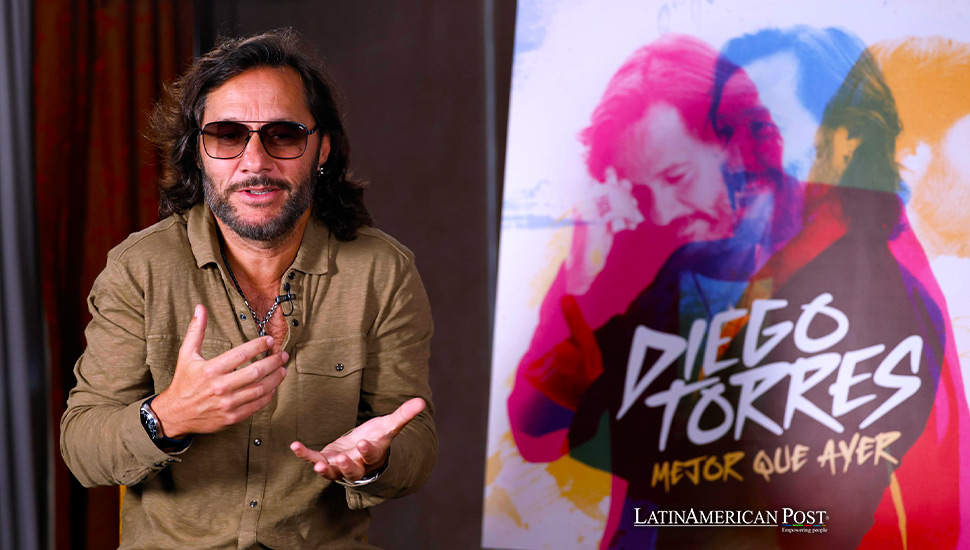Artist Diego Torres’ Cultural Advocacy Amid Political Strife in Argentina

In promoting his new album “Mejor que ayer,” Diego Torres highlight a broader Latin American issue where culture faces attacks from conservative factions, mirroring his experiences in Argentina. This situation underscores the cultural-political tension prevalent across the region.
Diego Torres, an acclaimed Argentine musician, finds himself at the crossroads of art and politics, particularly highlighted during his promotional tour for “Mejor que ayer” in Spain and Argentina. His journey reflects Latin America’s broader cultural and political landscape, where artists often navigate the turbulent waters of ideological disputes and governmental scrutiny.
In his native Argentina, Torres has become a symbolic figure in the ongoing debate over the role of government in the cultural sector. His critique of the right-wing factions, especially the administration under President Javier Milei, illustrates the tension between state support for the arts and accusations of cultural dependency on government subsidies. This debate is vividly seen in the context of the Instituto Nacional de Cine y Artes Audiovisuales (INCAA). This institution has faced significant financial cuts, sparking concerns about the future of Argentine cinema and arts.
Political Strife and Cultural Independence
The discord between Milei and the entertainment industry, notably with artist Lali Espósito, has brought to light the complex dynamics between politics and culture in Argentina. Torres defends Espósito and the broader artistic community, arguing against the notion that cultural figures are merely state-subsidized entities. His comments underscore the wider issue of political figures leveraging cultural funding debates to polarize and distract from more pressing national concerns.
Amidst these challenges, Torres envisions Argentina as a country where cultural and economic policies foster equality, opportunity, and national growth. He advocates for a balanced state presence, transparent governance, and a supportive environment for private sector investments, aiming for a stable economy free from the pitfalls of inflation and opaque legalities. His perspective is not just about defending the arts but also about promoting a sustainable model of national development that harmonizes governmental roles with private sector dynamism and cultural flourishing.
Artistic Evolution and Social Commentary
“Mejor que ayer” is not just an album but a statement from Torres, encapsulating his reflections on personal growth, societal change, and the enduring power of music to inspire and mobilize. His career, which transitioned from acting to music, has become a platform for engaging with social issues, advocating for change, and expressing a deeply rooted passion for artistic innovation and cultural integrity.
The album showcases Torres’s ability to blend genres and collaborate with other artists, reflecting the diverse tapestry of Latin American music. Collaborations with figures like Carlos Vives and Berta Rojas highlight the interconnected nature of the region’s music scene, bridging cultural gaps and fostering a shared artistic heritage. His work with family members in “Las leyes de la vida” further personalizes his music, tying in themes of family, legacy, and the passage of time, which resonate deeply with his audience.
Navigating the Cultural and Political Nexus
Torres’s narrative is a microcosm of Latin America’s more significant cultural and political dynamics, where artists often find themselves in the crosshairs of ideological battles and fiscal debates. His experiences in Spain and Argentina during his album’s promotion serve as a lens through which the intricate relationship between government, society, and the cultural sector can be examined.
In Latin America, the intersection of politics and culture frequently leads to contentious debates over national identity, heritage, and the role of the arts in public life. Torres’s outspoken stance in these debates highlights the ongoing struggle for artistic autonomy and the need for a supportive framework that nurtures the cultural sector’s growth and sustainability.
The situation in Argentina mirrors broader regional trends where cultural policies and political ideologies often clash. Across Latin America, governments and artists grapple with questions of funding, independence, and the impact of art on social and national development. These discussions are crucial in shaping the policies that govern cultural expression and defining artists’ role in societal progress and national discourse.
Looking Ahead: Art, Politics, and Society
As Diego Torres continues to promote “Mejor que ayer,” his journey symbolizes the broader challenges and opportunities facing artists in Latin America. His music and advocacy reflect a commitment to addressing societal issues, championing cultural freedom, and fostering an environment where art can thrive independent of political constraints.
Also read: The Tango Renaissance in Argentina Reclaims Identity
In conclusion, Diego Torres’s narrative weaves through the fabric of Latin American cultural and political landscapes, offering insights into the complex dynamics of art, governance, and societal change. His latest album and promotional activities are about music and engaging with the pressing cultural and political issues facing the region today. Through his artistic endeavors and public discourse, Torres contributes to the ongoing dialogue on culture’s role in shaping Latin America’s future, highlighting the need for policies that support artistic expression and cultural integrity in an ever-evolving societal context.





